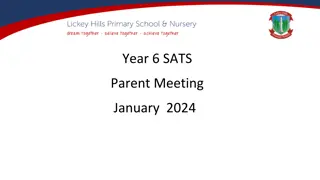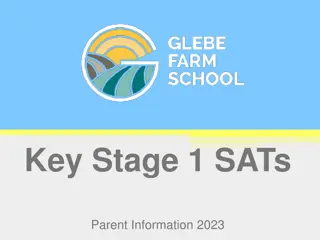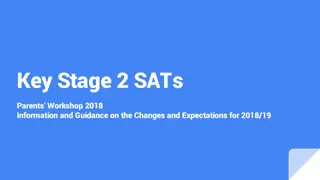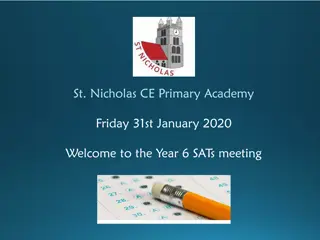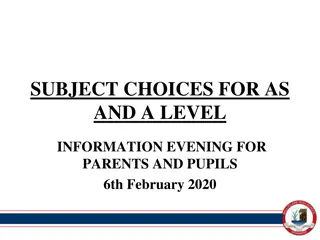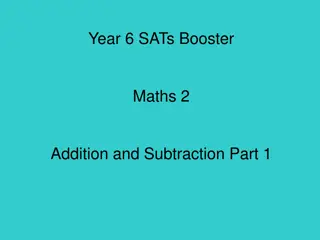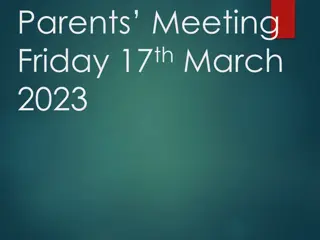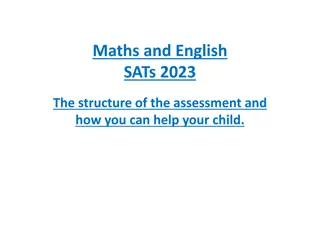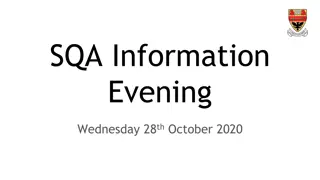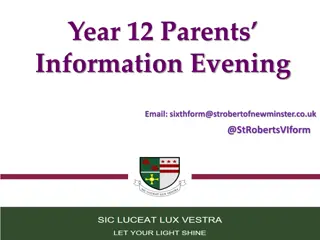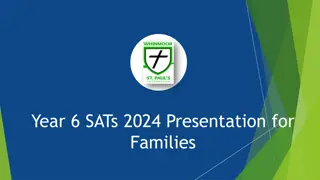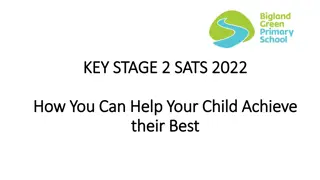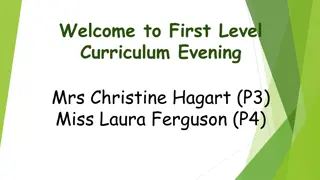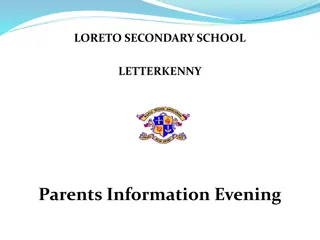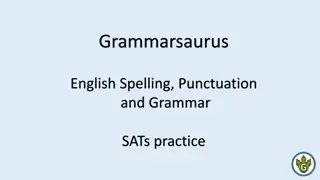Year 6 SATs Information Evening Overview
Explore how Year 6 SATs are conducted, the importance of these tests, preparation strategies, exam details, and the focus on subjects like reading. Understand the significance of tracking progress, interventions, and support for students during this crucial period leading up to the exams.
Download Presentation

Please find below an Image/Link to download the presentation.
The content on the website is provided AS IS for your information and personal use only. It may not be sold, licensed, or shared on other websites without obtaining consent from the author. Download presentation by click this link. If you encounter any issues during the download, it is possible that the publisher has removed the file from their server.
E N D
Presentation Transcript
Welcome to our Y6 SATs Information Evening! 1) Please remain muted until the end of our presentation. 2) Open up the Chat Feature please feel free to ask any questions during our talk. 3) Download the 2018 SATs papers to see the types of questions the children will experience.
To measure effectiveness of the school in comparison to local and national data To measure the child s progress and attainment Why do children sit SATs tests? To inform parents It was the best week of Year 6! Secondary school data
Preparation and Support - Their education throughout the whole of school - Revising & consolidating the curriculum in Year 6 - Re-visiting learning often (Early Morning Work, Flashback Maths) - SATs style homework tasks CGP books - Practice papers (formal and informal) - Keeping track of progress to inform parents and to adapt our teaching - Interventions - Official Mock SATs week around April - Gathering evidence to determine which children may require extra provision e.g. an adult to read questions to them in maths, extra time etc.
All exams are in the morning and there are none on Friday. Please avoid booking holiday during this time, or the lead up to SATs. They will need to be in school promptly or can attend a breakfast club.
Reading -1 hour to complete the test -3 texts, usually a range of fiction and non-fiction -A set of questions (usually around 12) about each text -Not a memory test the children can refer to the questions as much as they want! -Focus on understanding language style and vocabulary, retrieval of information and their comprehension through inference/deduction style questions. -Scored out of 50 1, 2 and 3 mark questions
Consider the type of questions you are asking your child when they are reading What does that word mean? Can you think of another word which means something similar? What impression does the word (provide word and context) glare give us about how Shirley felt towards her cousin? Can you find a word in this paragraph that is closest in meaning to (provide word) annoyed? In what year did (provide fact) the French authorities make it illegal for people to swim from France to England? In the last paragraph, X does not want to do something. Give two reasons why X does not want to do this. How was the character feeling when ? How do you know? What evidence is there in the text?
Spelling, Punctuation and Grammar (SPaG) - Comprised of 2 tests combined score - Test 1 (45 minutes) measures their punctuation, spelling and grammar skills: terminology, word class, sentence types and structures (50 marks) -Test 2 measures their ability to spell words using a variety of rules plus the ability to remember key exception words (20 marks)
Mathematics - Comprised of 3 tests - Test 1 (30 minutes) Arithmetic Not in context and a focus on number, fraction and percentages. Encourage the children to use efficient methods -Test 2 and 3 (each 40 minutes) Reasoning Questions are in context or require a deeper level of understanding than just procedural mathematics. Number geometry, coordinates, fractions, decimals and percentages, angles, algebra are covered
1 13 2 26 3 39 4 52 5 65 6 78 7 91 8 104 9 - 117 10 - 130
How well did my child do? A raw score (number of correct answers) The Test Once all children s results are in nationally, their raw score is converted into a scaled score. Scaled score Your child s SATs raw score, scaled score, school and national average scaled score and teacher assessment for science and writing. What s reported?
Scaled Score Child C Child A Child B Raw score 42/50 Standardised score of 114 110 or over is classed as Greater Depth Raw score 17/50 Standardised score of 93 Has not yet met the expected standard Raw score 26/50 Standardised score of 100 Met the expected standard Meeting the expected standard indicates that the child is in a good academic position to access the KS3 curriculum as their KS2 curriculum knowledge and understanding is at a good standard. Of course, some children will not meet the expected standard so we will endeavour to get them as close to this as possible as we will focus on their progress.
Home support to prepare for SATs -Encourage them! A positive attitude goes a long way! -Try to provide a quiet corner of the house for homework and study, that s as free from distractions as possible -Encourage your child to talk to us if they express persisting anxieties about SATs. Remember that a small amount of anxiety is normal and not harmful; -Listen to them read (with effective questioning!) -Support them with homework -Avoid using past papers there are plenty of inexpensive or free SATs practice materials for parents available. -Direct them to useful websites (Rockstars/BBC bitesize) -Bring learning into everyday life - practise key skills like times tables and practise mental maths in real world scenarios (shopping/cooking) -Help them to become resilient learners -Plan something restful for the weekends before and something fun for the weekend after SATs this will help your child start the week well and also give them something to look forward to; -Ensure your child has breakfast before school and brings in a snack and water bottle and ensure that they are getting a suitable amount of sleep.
We want these exams to be as relaxed and as stress-free as possible! Emphasis will be on effort and progress rather than attainment Any questions?




